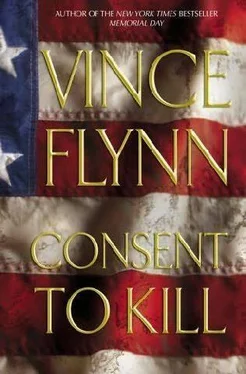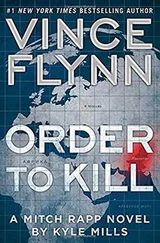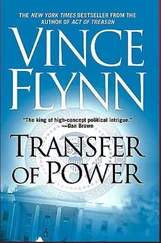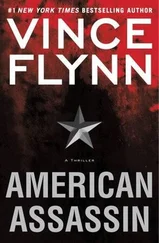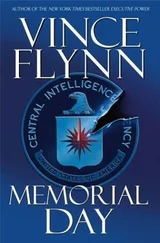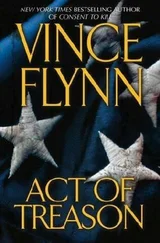"Why is that, sir?"
"Because you don't have to play by the rules, Irene, and they do."
"What about Ross?" Kennedy turned to Senator Hartsburg.
"Mark will be fine."
Kennedy shook her head. "I don't think so." She looked to the president expecting him to back her up. Ross had after all told the president about Rapp's insubordination and thuggish behavior.
Instead of giving her a knowing nod, Hayes's face twisted into a frown of confusion.
Kennedy realized at that moment that Ross had lied to her. "Mr. President, I don't think Director Ross has been as forthright with you as he's led me to believe."
"What has he led you to believe?"
"He told me that he briefed you on a problem he'd had with Mitch recently."
Hayes shook his head. "He hasn't said a word to me about Mitch since he got the job."
"Last week I was having a meeting in my office with Mitch and Scott Coleman." Kennedy spoke directly to the president. "Director Ross showed up at Langley unannounced and barged in on the meeting." Kennedy went on to explain how the IRS showed up on Scott Coleman's doorstep the next day and that Ross had his people call the Pentagon and request Coleman's service record. She ended the recap by explaining that Rapp had decided to pay Ross a visit at his office and when he walked in, Ross was having a meeting with several investigators and the topic of conversation was Scott Coleman. Rapp picked up a dossier containing Coleman's tax returns and slapped Ross across the face with it."
Hartsburg looked a little stricken, while Walsh and the president sat in stunned silence until finally Senator Walsh said, "I told both of you he was the wrong man for the job."
"He'll be fine," said a defensive Hartsburg. "I'll have a talk with him."
"He's done listening to you," grumbled Walsh. "I told you, he's a damn power-hungry peacock."
"I'll talk to him," the president said quietly.
"I don't want you to have to do that, Mr. President." Hartsburg had pushed Ross on the president and he felt obliged to straighten out the mess. "Let me have one more shot at him."
"Fine." Hayes turned his attention back to Kennedy. "We'll keep Ross off your back. You just stay out in front of Justice and the FBI."
"What about Mitch?"
The president leaned back and gave the matter some thought. After a lengthy pause he said, "Officially…I want him involved in the CIA's international aspect of this investigation. Please take special note of the word international." Hayes paused for effect. "Unofficially…he has my consent to kill anyone who had a direct hand in this."
VENICE, ITALY
The cruise ship turned into the Canale di San Marco, churning up a muddy wake as it slipped slowly through the water. The vessel seemed ridiculously large to be entering such a narrow body of water, but Abel reasoned they knew what they were doing. Tourism was after all Italy's biggest industry and it wouldn't do to have one of these steel behemoths ramming its prow through the intricate faзade of the Palazzo Ducale. This was the third such ship this afternoon and by far the largest. Abel was lounging on the terrace of his $2,000-a-night penthouse that overlooked the confluence of the Grand Canal and the San Marco Canal. During the peak summer season the room ran $5,000 a night, but only a fool would come to Venice in the summer. The city was overrun with tourists. Heat and humidity combined with sweat to give off a sour odor that could be exceedingly unpleasant. Prices were obnoxiously high and service was shoddy. Fall or spring, though, was a different matter. The temperature was mild and with the humidity gone the ripe summer smell of the canals was gone. The narrow streets were passable, and the service was good.
The ship let loose three quick bursts from its horn. Abel glanced up at the passengers who seemed to be on top of him. They lined the railings of all four decks, towering over him, taking photos, waving, and gawking. If there was one common denominator among them it was that they in general seemed unconcerned with physical fitness. While he perched atop his penthouse sundeck, they looked down on him like plump birds in search of a morsel of food. His initial awe over the engineering it took to assemble such a ship and then maneuver it through the tight channel was now gone, replaced by a sense of irritation that these commoners were intruding on his privacy. Abel did his best to ignore them and read the screen of his laptop.
It had been an interesting day. He had risen from a sound night's sleep at 7:00 a.m. and showered and shaved. Breakfast in the grand ballroom was followed by a long walk around the city. He'd crossed over the Grand Canal to San Paolo and then Santa Croce with no intent other than to observe how the unique floating city prepared itself for another day. Garbage barges came and went. Water taxis and ferries brought people from the mainland and the surrounding islands to work. Food, office products, mail, wine, merchandise, and everything else it takes to keep a city functioning was brought in by water and off-loaded by young, strong men wielding carts of varying shapes and sizes. It was a way of commerce that was unique to Venice.
Abel returned to the hotel before 10:00 and checked his e-mail. He was both pleased and shocked to find a message that Mitch Rapp was dead. And not only was he dead, but the assassin had managed to make it look like an accident. Abel was absolutely floored by the speed and apparent ease with which the contract had been carried out. Saeed Ahmed Abdullah would be a very happy man. It was no surprise that the assassins were demanding payment immediately. As tempting as it was for Abel to call Abdullah and give him the good news, he knew that he should confirm the story from an independent source. With the time difference between Venice and Washington, DC, it took a while. For fear of raising unwanted attention he did not want to call any of his contacts in the international intelligence community. At 2:00 in the afternoon he was finally able to track down the story on the Washington Post's Web site. Abel read the words with his heart in his throat. A quarter of the way into it he began dancing around the room. He had just made an additional six million dollars without having to lift a finger. Abel was not a dancer, and he was not someone accustomed to spontaneous celebration, but this was an exception.
After finishing the article he called Abdullah directly via an encrypted satellite phone and told him the news. The father began sobbing. In between sniffles he praised Allah and thanked Abel profusely for giving him his just retribution. Not wanting the call to last too long Abel brought up the issue of payment. Abdullah said it would be taken care of before the close of business today and thanked Abel over and over for helping him. Abel demurred, and then ended the call by warning the billionaire to be very careful. Even though the American press was calling it an accidental explosion, there would surely be people at the CIA who would never believe it for a second.
Now the close of business was approaching, and Abel was nervously waiting for confirmation from the various banks that the funds had been received. Twelve million dollars in total. After Prince Muhammad bin Rashid requested that Abel make the murder look like an accident, the German had ignored the request to shoulder the cost himself and had taken the matter to Saeed Ahmed Abdullah. The billionaire seemed entirely unconcerned by any investigation that might take place after Rapp's death. Abel tried to impress him with the potential gravity of the aftermath, but Abdullah cared not how Rapp was killed-only that he was killed. Abel pressed him further until the billionaire finally agreed to foot the bill.
Twelve million dollars total, and it had taken less than two weeks. Abel thought that it must be a record in his line of work. It was going to be difficult not to brag about his payday, but there was an obvious disincentive. If the assassins found out they would likely kill him, and if the Americans found out they would torture him and then kill him. He would keep his mouth shut for some time. Maybe in twenty years, when he finally slowed down, he could write his memoirs and take credit for killing America's top counterterrorism operative. He knew where the real risk lay, and unfortunately there was nothing he could do about it. The father would want to brag. He would want to take credit for killing the mighty Mitch Rapp.
Читать дальше
